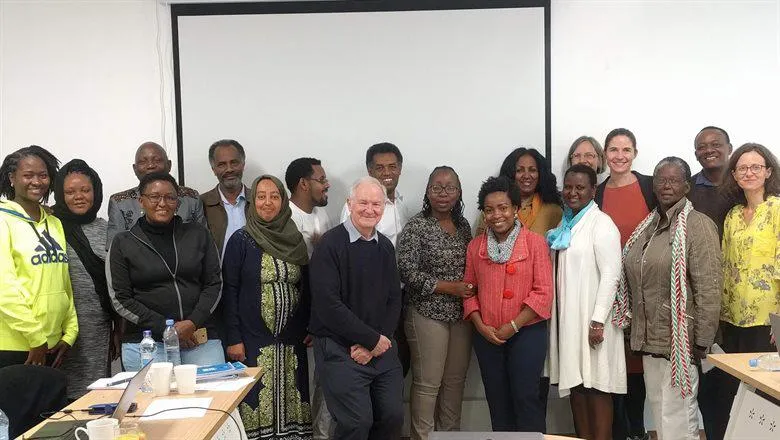SPARK provides a wonderful opportunity to make a difference in the lives of Ethiopian and Kenyan children with developmental disorders and their families. We know these families experience severe challenges, including social isolation, stigma and poverty. SPARK allows us to work with families, policy-makers and advocates to conduct high-quality research generating evidence on how to implement a sustainable model of care for these families in a context of high need and extremely limited resources.
Dr Rosa Hoekstra, Institute of Psychiatry, Psychology & Neuroscience, co-principal investigator of SPARK
22 May 2020
Research project receives £4.3m to help improve mental health of African children with developmental disorders
A global research project led by King’s College London researchers has been awarded £4.3m of funding from the National Institute of Health Research (NIHR) to improve the wellbeing and mental health of children with developmental disorders and their caregivers in Ethiopia and Kenya.

Announced today (22 May 2020), the ‘SPARK project: (SuPporting African communities to increase the Resilience and mental health of Kids with developmental disorders and their caregivers)’ has received the funding through the NIHR Research and Innovation for Global Health Transformation (RIGHT) scheme for four years.
Ethiopian and Kenyan families with children with developmental disorders (including autism and intellectual disability) experience severe challenges and most families receive no formal support. The SPARK project will develop and evaluate context-appropriate care models for these families, with local communities.
The project is a collaboration between King’s College London, Oxford University, Addis Ababa University in Ethiopia, Kenya Medical Research Institute (KEMRI) and Aga Khan University in Kenya and the World Health Organization (WHO) and is co-led by Dr Rosa Hoekstra from the Institute of Psychiatry, Psychology & Neuroscience (IoPPN), King’s College London and Prof Amina Abubakar from Aga Khan University.
Due to stigma and parental blame, children with developmental disorders often remain locked in their home. Most children with developmental disorders in sub-Saharan Africa do not attend school and receive no formal support. Affected families often live in poverty as care responsibilities mean caregivers are unable to work. Caregivers report severe stress and social isolation; many caregivers report mental health problems, including suicidal thoughts.
The first goal of the SPARK team is to train people who know the local child community well (e.g. health workers or teachers) to help them identify children with developmental disorders and to raise community awareness. Identified children will be referred to the new Caregivers Skills Training (CST) programme developed by the World Health Organization (WHO).
The next stage will involve testing how well the CST works and whether the programme is cost-effective. The CST teaches caregivers strategies to support their child’s development and reduce challenging behaviours. The programme also addresses caregiver wellbeing, and because the programme is delivered in groups it helps parents escape social isolation.
Throughout, the SPARK project will involve local leaders, teachers, health workers and parents of children with developmental disorders in the development of the care model so that barriers to accessing health and education services can be overcome, and to promote community-based support and inclusion.
We are excited about SPARK because we know the vast unmet needs of families with a child with developmental disorders in Ethiopia – here is a chance to make a difference with high-quality research on what works to improve lives.
Dr Charlotte Hanlon, Institute of Psychiatry, Psychology & Neuroscience, SPARK co-investigator and in-country PI (Ethiopia)
The team have previously adapted and pilot-tested the CST programme in Ethiopia and Kenya, showing that the training can be delivered by non-specialist facilitators and is welcomed by caregivers. In this new project they propose to conduct the first large scale evaluation of the impact of the programme across both countries, including rural and urban settings. In addition to comparing families who participated in the programme with families who have not yet taken part, they will collect information from each setting to explore context-specific issues.
Supported by academics from King's College London, University of Oxford and WHO, the research will be conducted by Ethiopian and Kenyan researchers, clinicians and students. The findings will be shared with local stakeholders, including policy makers, local and national governments as well as with WHO and international partners to inform future implementation of care models for children with developmental disorders across the world.
SPARK list of named investigators
KCL
Co-PI: Dr Rosa Hoekstra, Rosa.Hoekstra@kcl.ac.uk
Co-investigators:
Dr Charlotte Hanlon
Prof Tony Charman
Prof Andrew Pickles
Dr Nadine Seward
Dr Muralikrishnan Radhakrishnan Kartha
Named postdoc: Dr Bethlehem Tekola Gebru
Ethiopia
Co-investigators:
Prof Abebaw Fekadu
Dr Fikirte Girma
Dr Girmay Medhin
Dr Tigist Zerihun
Dr Rehana Abdurahman
Community-based co-investigator: Zemi Yenus
Kenya
Co-PI: Prof Amina Abubakar
Postdoc: Dr Julie Jemutai
Community-based co-investigator: Leonard Mbonani
Oxford
Co-investigator: Prof Charles Newton
WHO
Co-investigator: Dr Chiara Servili
